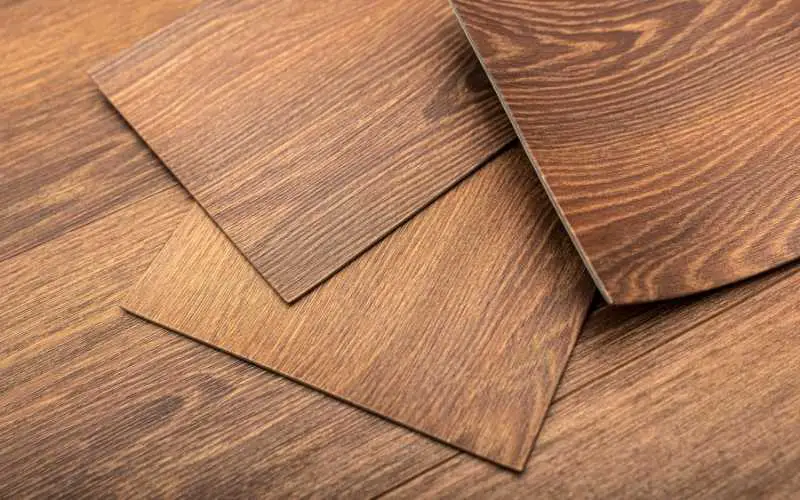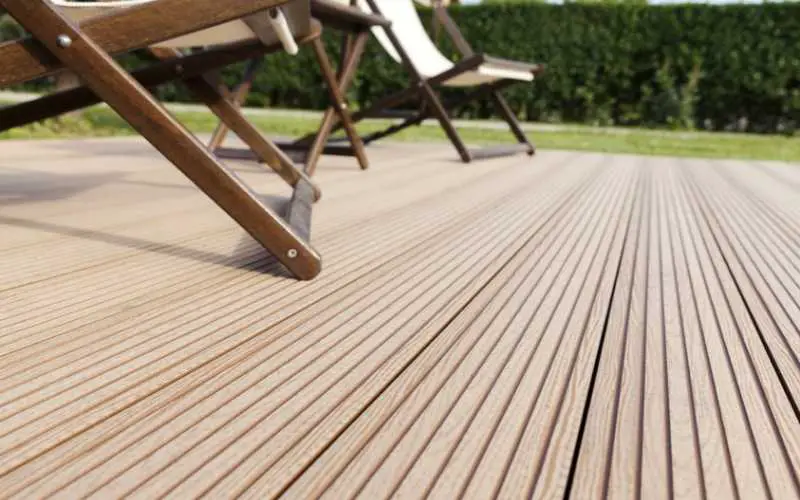Vinyl is short for polyvinyl chloride, or PVC is a plastic that’s versatile, strong, and waterproof. PVC (or Vinyl or polyvinyl chloride) flooring was initially designed and marketed as a perfect alternative to linoleum.
Can you use vinyl flooring outside? No, you can’t use Vinyl Flooring on outside space, except for particular Vinyl products, made to stand the pressure and dangers from rain and Sunlight.
Read on as we throw more light on this.
Related: Vinyl Plank Flooring Cupping
Can You Use Vinyl Flooring Outside?
Table of Contents
No, you can’t use Vinyl Flooring on outside space, except for particular Vinyl products, made to stand the pressure and dangers from rain and Sunlight.
What is Vinyl Flooring?
Vinyl flooring is a type of flooring with a polymer core made from polyvinyl chloride, better known as PVC.
Vinyl is short for polyvinyl chloride, or PVC is a plastic that’s versatile, strong, and waterproof. PVC (or Vinyl or polyvinyl chloride) flooring was initially designed and marketed as a perfect alternative to linoleum.
Note: When vinyl flooring is a combination of wood and PVC, it is known as WPC, and if it is made from stone (calcium carbonate) and PVC, it is known as SPC.
Vinyl floors are usually covered with waterproof textile fabrics or decorative paper made to look like stone or wood and make any area look unique and beautiful.
Before we enumerate some of the reasons I think vinyl flooring is a bad option for your home’s outside area, let’s talk about some pros of vinyl flooring:
Benefits of Vinyl Flooring
1. Vinyl Floors Are Always Easy to Clean
Very little maintenance is needed with vinyl flooring. Spending a lot of time cleaning isn’t required; the dirt goes off quickly, giving the floor an incredible sheen.
2. Vinyl Floors Are Durable
Vinyl floors are visually appealing and this is a result of their customized, beautiful designs.
3. Vinyl Floors Are Quite Affordable
Vinyl flooring installation is relatively cheaper than other materials, such as hardwood, tiles, or carpet. You can afford Vinyl floors, even if you’re on a tight budget.
It’s important to note that the prices of vinyl flooring differ depending on the texture, design, and brand you’re choosing.
5. Vinyl Floors Are Versatile
Vinyl floorings come in a wide range of options, designs, colors, and textures, giving you a wide range of choices.
6. Vinyl Floors Are Always Comfortable
Vinyl floors are popularly known as one of the most comfortable floors.
7. Vinyl Flooring is Resistant to Moisture
The most significant advantage of using vinyl flooring is 100% water repellent.
8. Comparatively Easy to Install
The vinyl flooring installation process is more straightforward than laminating or tile flooring. This flooring option can be installed by untrained personnel, such as the homeowner.
Read: Are Ruggables Safe for Vinyl Plank Flooring?
Disadvantages of Vinyl Flooring
1. Difficult to Remove
Removing vinyl flooring can be difficult due to adhesives and glues.
You may have difficulty removing vinyl flooring since they’re glued down and won’t come off quickly.
2. Not Eco-Friendly
Vinyl flooring is not eco-friendly; that is, it cannot be recycled. If you’re an environmentally-conscious consumer, you will most certainly not purchase or use Vinyl Flooring. This is because they are non-biodegradable.
Vinyl flooring might not be an option for you if you’re a cultural activist or environmentally-conscious consumer since vinyl flooring is not degradable and challenging to recycle.
3. Color Fades If It Gets Exposed to Sunlight
This brings us to why Vinyl Flooring is wrong for your outdoor space. If Vinyl (PVC) is exposed to the UV rays from Sunlight, there is a high chance of noticeable discoloration and fading.
Reasons Outside Vinyl Flooring Is a Bad Choice
Outside spaces are usually exposed to elements of nature like rainfall, Sunlight, and cold temperatures.
All of these can pose a heavy threat to the longevity of Vinyl Flooring. Like most mechanical materials exposed to rain, Sunlight, or cold temperatures, Vinyl Flooring is susceptible to discoloration, wear and tear, and total depreciation.
Also, outside vinyl flooring (vinyl flooring on your patio, porch, or courtyard) is prone to damage from your pets and kids.
Far from popular opinion, Vinyl Flooring is prone to mildew and mold. It’s waterproof. Yes! But have you thought of the likelihood of water sipping into it from the seams? Remember, Vinyl comes in planks and tiles, and sheets.
Exceptions
There are some exceptions to my thought, though. Vinyl flooring can be used for your outdoor spaces if you (the homeowner) consciously and intentionally put the following place:
1. Install side-screening on your porch or roofing on your patio before installing vinyl flooring. This enclosure and cover will reduce your floor’s exposure to temperature changes, Sunlight, and rain and, as a result, will make it less likely to be damaged and long-lasting.
2. Avoid installing Vinyl Flooring under direct Sunlight. As a homeowner, you have to primary duty of making sure that your outside vinyl flooring isn’t directly under Sunlight unless the manufacturer clearly states that. Exposing your vinyl flooring to direct sunlight will cause it to fade and break over time.
3. Avoid using the Loose Lay Vinyl Flooring option. Make sure to glue your Vinyl Flooring on the floor. No floating floors! Note: using glue will add to the cost of your vinyl flooring, but you must use glue for your outside floor longevity.
4. If you’re installing outdoor vinyl flooring, install a foundation/subfloors to support it. Subfloors are mostly made of concrete or wood. Any following will do so long as they are even and have been treated to resist moisture.
Outside Vinyl Flooring options are Econodek, G-floor, Tufdek, Deco floors, Duradek, Proximity Mills, Shaw Floors, COREtec, Armstrong flooring, and Karndean. The above flooring offers durable vinyl floors that will work for your outdoor spaces.
Read: Does Vinyl Flooring Expand and Contract?
Conclusion
Our recommendation is if you’re looking to design your outside patio, porch, or veranda floor, it will be better and more sustainable to use other durable flooring options.
Marble won’t be a bad idea! Remember, it’s a natural stone that has the potential to last a lifetime.
The dangers of using Vinyl for your outside spaces are enormous and grave. A hardscaping flooring material will be a better option for your outdoor flooring, especially if you want longevity.
Due to the advantages of the vinyl flooring option, you might want to go for it for your outdoor space.
We wrote this article about if you can use vinyl flooring outside to help give you guidance when faced with making a choice about it.
We hope you found it helpful and informative. If you did, please share it across your entire social media pages

